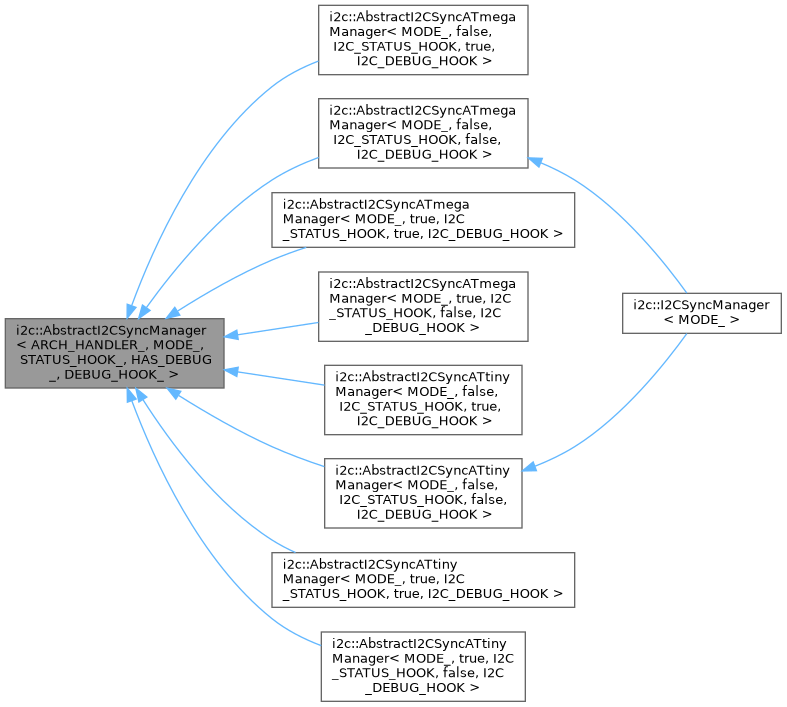Abstract synchronous I2C Manager for all MCU architectures. More...
#include <fastarduino/i2c_handler_common.h>

Public Types | |
| using | ABSTRACT_FUTURE = future::AbstractFakeFuture |
| The abstract base class of all futures to be defined for this I2C Manager. More... | |
| template<typename OUT , typename IN > | |
| using | FUTURE = future::FakeFuture< OUT, IN > |
| The template base class of all futures to be defined for this I2C Manager. More... | |
Public Member Functions | |
| void | begin () |
| Prepare and enable the MCU for I2C transmission. More... | |
| void | end () |
| Disable MCU I2C transmission. More... | |
| void | begin_ () |
| Prepare and enable the MCU for I2C transmission. More... | |
| void | end_ () |
| Disable MCU I2C transmission. More... | |
Friends | |
| template<typename > | |
| class | I2CDevice |
Detailed Description
class i2c::AbstractI2CSyncManager< ARCH_HANDLER_, MODE_, STATUS_HOOK_, HAS_DEBUG_, DEBUG_HOOK_ >
Abstract synchronous I2C Manager for all MCU architectures.
A specific abstract subclass is defined for each MCU architecture (ATmega, ATtiny). You should never need to subclass AbstractI2CSyncManager yourself.
- Template Parameters
-
ARCH_HANDLER_ the type of an actual class handling I2C control on actual target architecture MODE_ the I2C mode for this manager STATUS_HOOK_ the type of the hook to be called. This can be a simple function pointer (of type I2C_STATUS_HOOK) or a Functor class (or Functor class reference). Using a Functor class will generate smaller code.HAS_DEBUG_ tells this I2C Manager to call a debugging hook at each step of an I2C transaction; this is useful for debugging support for a new I2C device; using falsewill generate smaller code.DEBUG_HOOK_ the type of the hook to be called when HAS_DEBUG_istrue. This can be a simple function pointer (of typeI2C_DEBUG_HOOK) or a Functor class (or Functor class reference). Using a Functor class will generate smaller code.
Definition at line 419 of file i2c_handler_common.h.
Member Typedef Documentation
◆ ABSTRACT_FUTURE
| using i2c::AbstractI2CSyncManager< ARCH_HANDLER_, MODE_, STATUS_HOOK_, HAS_DEBUG_, DEBUG_HOOK_ >::ABSTRACT_FUTURE = future::AbstractFakeFuture |
The abstract base class of all futures to be defined for this I2C Manager.
For a synchronous manager, it is always future::AbstractFakeFuture.
Definition at line 435 of file i2c_handler_common.h.
◆ FUTURE
| using i2c::AbstractI2CSyncManager< ARCH_HANDLER_, MODE_, STATUS_HOOK_, HAS_DEBUG_, DEBUG_HOOK_ >::FUTURE = future::FakeFuture<OUT, IN> |
The template base class of all futures to be defined for this I2C Manager.
For a synchronous manager, it is always future::FakeFuture.
Definition at line 441 of file i2c_handler_common.h.
Member Function Documentation
◆ begin()
|
inline |
Prepare and enable the MCU for I2C transmission.
Preparation includes setup of I2C pins (SDA and SCL). This method is synchronized.
Definition at line 450 of file i2c_handler_common.h.
◆ end()
|
inline |
Disable MCU I2C transmission.
This method is synchronized.
Definition at line 461 of file i2c_handler_common.h.
◆ begin_()
|
inline |
Prepare and enable the MCU for I2C transmission.
Preparation includes setup of I2C pins (SDA and SCL). This method is NOT synchronized.
Definition at line 473 of file i2c_handler_common.h.
◆ end_()
|
inline |
Disable MCU I2C transmission.
This method is NOT synchronized.
Definition at line 484 of file i2c_handler_common.h.
Friends And Related Function Documentation
◆ I2CDevice
|
friend |
Definition at line 662 of file i2c_handler_common.h.
The documentation for this class was generated from the following file:
- fastarduino/i2c_handler_common.h